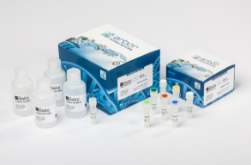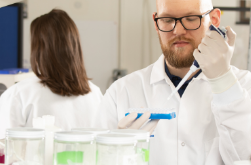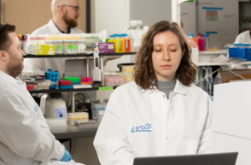Overview
No matter what your application or input material, Daicel Arbor Biosciences selects the best library preparation workflow for your sequencing project. We have validated protocols for all short-read and long-read sequencing platforms for a wide range of DNA or RNA quantities and qualities. Our Library Preparation service is the perfect complement to our Targeted Sequencing service, providing a comprehensive solution.
- Versatile—We have a wide range of workflows for sequencing DNA, cDNA, or RNA molecules of any length and any level of damage.
- Customized—Our experts choose and perform the optimal protocol to suit your application.
- Quality assured—QC evaluation checkpoints integrated throughout our workflows help ensure that only material with the best chance of success is moved forward.
| Any platform | Any sample |
|---|---|
|
|
Benefits
Comprehensive and powerful
We have a full range of NGS library preparation techniques to accommodate most DNA-, RNA-, and methyl-seq applications. Whether you are working with high-quality/quantity or low-quality/quantity material, we can maximize the chance of success for your samples.
The latest technology
We have developed and curated a range of customized, in-house NGS protocols that utilize the latest in high-quality, industry-standard reagents for efficiently converting DNA and cDNA/RNA into NGS libraries suitable for sequencing on any platform.
We love tough samples
Our scientists have demonstrated expertise in preparing degraded and ancient samples that often require specialized protocols and extensive quality control. Our extensive experience with difficult samples enables us to determine the best way to successfully prepare libraries from challenging samples.
Expert guidance
Not sure which options are best? Our experts will work with you to develop a project configuration that matches your project goals and sample characteristics.
Applications
Daicel Arbor Biosciences has extensive experience in preparing DNA, RNA, and cDNA libraries for a wide range of applications, including:
DNA sequencing for genomics and metagenomics
- DNA library preparation for:
- High-quality DNA, double-stranded
- Degraded DNA, double-stranded
- Degraded DNA, single-stranded
- RNA/cDNA library preparation
- Library QC
RNA sequencing for transcriptomics and gene expression
Long-read sequencing for complex regions and high-level assembly
- DNA/cDNA long-insert library preparation
- Library QC
Degraded DNA sequencing for ancient DNA
- DNA library preparation for:
- Degraded DNA, double-stranded
- Degraded DNA, single-stranded
- Library QC
Methylation sequencing for epigenetics
Resources
FAQs
Many sample types and species will require special permits for shipping internationally (or domestically). We can provide some advice, but ultimately you are responsible for proactively identifying the permit(s) that are required for your unique samples. Some examples of biological samples that require permits are tissue or DNA from CITES-listed specimens and plant tissues regulated by the USDA/APHIS.
If Daicel Arbor Biosciences is required to apply for an import permit on your behalf, you will be required to pay a permit application fee, regardless of whether the application is successful.
We strongly encourage our customers to research shipping regulations before contacting us about your project to determine your specific permit needs. Incorrect or incomplete documentation may result in the seizure and loss of your samples at Customs, and potentially the assignment of fines/fees.
Yes. We require documentation that all relevant and necessary ethics approvals have been granted for any human specimens that you would like us to work on. This includes both contemporary and ancient samples and includes both tissue and nucleic acid derivatives. Please contact us to receive our Ethics Statement document if you are interested in sending human samples to us. We do not accept clinical specimens and are not CLIA-certified.
We prepare short-insert libraries with 8-bp unique dual indexes.
We prepare long-insert libraries with 16 bp identical dual indexes.
Our library preparation protocols have been carefully tested and optimized for both WGS and targeted sequencing applications. We have protocols that are appropriate for a wide range and variety of input qualities and quantities that have been successfully applied to thousands of samples. Therefore it is very likely that one of our existing protocols will work well for your application, but if you have very specific project constraints, our NGS experts would be happy to discuss the options with you.
Upon arrival, we will take a look at your shipment and plastics to ensure that the samples have not been damaged during their journey. At that point, your project will enter our QC queue.
For Standard and Long Insert quality DNA samples, we will quantify the total gDNA with a spectrofluorometric assay, purify up to 80% of the material, and re-quantify the samples. For Degraded quality DNA samples, we will perform the initial total gDNA quantification as well as visualize at minimum a subset of your samples on the Agilent TapeStation platform. For Ancient quality DNA samples, we will perform the initial total gDNA quantification and may visualize a subset of your samples on the Agilent TapeStation platform.
For RNA samples, we will perform a total RNA quantification. If you have ordered our RNA clean-up, we will perform a DNase treatment, a bead-based purification, a visualization via Agilent TapeStation, and a second total RNA quantification.
For pre-made libraries, we will perform a total gDNA quantification as well as a qPCR-based assay for properly adapted Illumina-compatible library molecules.
If you order QC-only services, the “Standard QC” is the same as the Standard DNA quality QC above. The “Extended QC” is the same as the Degraded DNA quality QC.
We will provide a QC report with the results of our QC to you when you send us DNA, RNA, or libraries. We will also perform the appropriate QC and send the QC report for samples for which we perform the DNA/RNA extraction.
Yes. You can order our “Degraded DNA Package” if you would like our full service package or “Extended QC” if you would like a custom project configuration and we will evaluate the quantity and the quality of your samples. You will be provided with a QC report and our NGS experts are available to consult with you about the results and can suggest some options for moving forward with your project.
Yes. We are able to expedite a select number of projects at a given time. Please inquire if you believe your project needs to be expedited and we will let you know if we have availability in our expedited pipeline and if the desired project timeline is feasible. When a project is expedited, it will skip our regular queue. We do not guarantee a specific turnaround time guarantee for expedited projects. We will do our best to be transparent with anticipated timelines and will communicate progress as well as delays with you during the process.
Yes. Please do your best to provide your project information as accurately as possible and we would be happy to provide a price estimate for you to use in your grant proposal. However, please be aware that our prices may change between when your estimate is provided and when your grant is funded.
Our goal is to provide NGS services for your project as if you were working directly with one of your research collaborators. We strive for a transparent and cooperative approach to NGS projects, and will communicate openly with you to find the right solution for your individual research design needs. We have decades of collective experience in molecular biology, including target capture & high-throughput sequencing, and working with difficult specimens.
In order to facilitate transparent, collaborative projects, we have opted to not offer specific guarantees for target capture & sequencing service projects, since every custom project is completely unique. In science, sometimes research projects do not go 100% according to plan. However, you will only pay for the services that we actually perform. We will give every project our individual attention, and all laboratory work is performed by hand on the bench by our team of dedicated & experienced researchers. We aim to provide you with the very same dedicated laboratory attention that you & your research team would give to your own work. You can be assured that we will communicate openly with you about all aspects of your project, and will not commit to a project before first discussing all the options with you.
Please find the current submission guidelines and sample preparation instructions in the “Resources” section. These guidelines should be sufficient for most standard DNA or RNA extracts derived from fresh, high-quality, relatively recent specimens (e.g. DNA extracted from fresh, frozen, or alcohol-preserved tissues) or for submission of pre-made NGS libraries.
In addition, we are currently accepting most service projects for atypical or sensitive samples, including specimens with degraded or rare targets (e.g., ancient DNA, museum, archival, metagenomic, environmental, etc). However, you should first contact us with more information about your samples & research goals, so that we can determine if we are able to accept your project.
Yes we can, however we caution that there is a higher risk of sample and/or target drop-out for low-input and/or low-quality samples. In our experience across many project types, the recommended amounts outlined in the Sample Preparation Guide provide the best results.
We have outlined specific recommendations for Standard, Degraded, and Ancient DNA handling in our Sample Preparation Guide. We may recommend or request that you change the handling/package type based on the specific quantity/quality of DNA present in your samples if they do not meet the criteria for the handling type that you ordered. If you decide to proceed with a handling/package type that does not align with the quantity/quality of the DNA, you assume the risk that your sample(s) may result in little or no useful data.
We do not have a minimum sample number, but we advise that smaller projects will have a higher per-sample cost than larger projects due to the labor required to process a batch of samples and our volume discount pricing. There is no maximum sample count per project.
Please see our NGS Service Policies PDF document (available under Resources) for more detailed information.
Due to the inherently variable nature of target capture & high-throughput sequencing experiments (especially for new, untested, custom baitsets), we are unable to offer service guarantees related to turnaround time, unique read sequencing coverage depth, on-target percentage, and other experimental outcomes.
In order to facilitate transparent, collaborative projects, we have opted to not offer specific guarantees for service projects, since every custom project is completely unique. In science, sometimes research projects do not go 100% according to plan, and for target capture, it is very difficult to plan for specific sequencing outcomes without prior experimental data. However, you will only pay for the services that we actually perform, and we will not accept a project before discussing all the options with you.
You will receive updates and estimated timelines for completion of different stages of your project. If you are working within a specific deadline, we will certainly make every effort to accommodate that, though we cannot guarantee that it will be possible to finish your project within that window.
We are able to expedite a limited number of projects at any one time, please inquire if you believe your project needs to be expedited. When a project is expedited, it will skip our regular queue. We do not guarantee a specific turnaround time guarantee for expedited projects.
We offer extraction services for DNA and RNA for multiple sample types. Some of the options for fresh samples are tissue (including plant leaves and seeds), cells, blood, and saliva. We also have the facilities and expertise for performing DNA extraction on degraded specimens, including bones, teeth, soft tissue, FFPE, and other sample types.
If you have special or sensitive samples, we may be able to offer extraction services for your project, depending on the circumstances. Please contact us directly to inquire about special service options.
Yes. We have a small cleanroom on-site where we perform all pre-PCR procedures. We can accommodate most common ancient, museum, or historical sample types, such as bones, teeth, and soft tissue. If you have a different or unusual sample type, please contact us to discuss your project needs in greater detail.
We offer NGS services on non-hazardous DNA or RNA extracts, whether from high-quality or degraded specimens. However, your samples should still meet our standard submission requirements for your type of service project, including relevant negative controls where applicable. Otherwise, your samples may be unable to pass our quality controls, or your project could be delayed. Please review the guideline documents in the Resources section.
Please note that if you are shipping your samples internationally which require any sort of import permit, you are responsible for identifying the permit and will incur a fee for any permit applications. Additionally, we require proof of ethics clearance for working with any human or human-derived samples.







 Bluesky
Bluesky